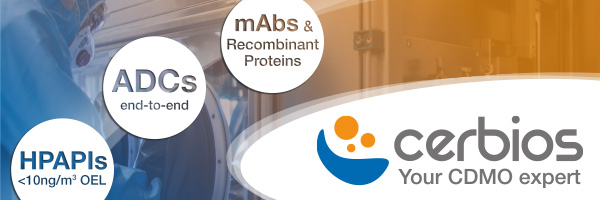Contract Services
Continuous transformation of pharmaceutical manufacturing 1st February 2019
By Gareth Jenkins and Paul Quigley, Arcinova
Arcinova’s Gareth Jenkins, CSO, and Paul Quigley, Head of Drug Substance, offer their views on the benefits of continuous flow c
Arcinova’s Gareth Jenkins, CSO, and Paul Quigley, Head of Drug Substance, offer their views on the benefits of continuous flow chemistry in synthesizing pharmaceutical products, with a focus on recent developments such as modular systems and real-time analytics.

Continuous flow chemistry provides drug manufacturers with a process for creating active pharmaceutical ingredients (APIs) quicker and more efficiently than was previously available. Some of the more traditional methods involved batch manufacturing where reactants were added to a single reactor, under pre-defined conditions. On the other hand, continuous flow manufacturing utilizes a streamlined approach by maintaining a continuous flow of reactants into the chemical process under controlled conditions. This method enables multiple reaction components to be synthesized sequentially, ensuring that each generated compound can be moved quickly to the next reaction stage.
Bringing benefits to Pharma
Continuous flow technology is particularly suitable for fast, challenging chemistries that are difficult to control. These include exothermic and cryogenic reactions that are typically hard to control in large-scale batch reactors. This approach has been successfully applied to drug development processes that are not feasible through batch manufacturing due to high batch counts, low yields and poor selectivity.
Flow chemistry can also be used to intensify reaction conditions and improve volumetric efficiency. This brings significant economic advantages through greater laboratory efficiency and reduced operating costs. The application of flow chemistry in drug development can reduce the time for early stage delivery by months, while improving yield and purity. The acceleration of reactions enables faster product delivery to clients. Flow chemistry is also easier to scale as issues such as heat transfer and mixing are more easily controlled during the reaction. This is an essential factor to consider during early-stage drug development.
Though there are significant benefits to a continuous flow approach, it necessitates an investigative mindset. A strong understanding of the chemistry behind each reaction is required to form an assessment of opportunities for compressing development steps within a flow reactor. By combining scientific talent with technological advances in flow chemistry, companies are now able to quickly understand a process, the chemistry driving it, and the best route for manufacture.
Industrial adoption
Though continuous flow manufacturing offers a more flexible and controlled approach to drug development, significant large-scale commercial adoption has largely been absent in the pharmaceutical industry. Many companies have invested heavily in batch manufacturing and have a limited capacity to add continuous flow capabilities. Nonetheless, Contract Research and Development Organizations (CRDOs) that have invested in flow technology from the start have a real advantage in delivering drug products quickly and efficiently.
Some of the latest developments being investigated in continuous flow manufacturing involve the utilization of modular systems. Modular systems create flexible manufacturing solutions that allow CRDOs like Arcinova to assemble reactors, run a process, disassemble, clean and then re-engineer for the next project. Investment in flow technology from the outset has allowed these companies to immediately benefit from the flexibility and cost efficiency of continuous flow manufacturing and pass these benefits on to their clients.
Arcinova is also enhancing its continuous flow capabilities through the application of real-time and controlled systems analysis. Reactions can be monitored live through the use of a FT-IR (Fourier-transform infrared) spectroscopy probe within the reactor. This probe provides real-time analytical data that can be used to automatically adjust reaction conditions and optimize the process quickly, without dramatically increasing volume or timescale. The controlled system reduces the need for multiple experiments as optimal parameters such as temperature, pressure and solvent flow rates are evaluated in a process control loop. Once identified, the conditions can then be transferred to a larger scale system.
Flow chemistry and personalized medicine
The healthcare industry is moving towards a more personalized approach with research concentrating on identifying markers for patients that will respond to a particular type of therapy. Drug manufacturing must respond with economical methods to produce smaller volumes with a reduced manufacturing footprint. The combined agility and flexibility that continuous flow manufacturing achieves will enable the quick development of bespoke medicines for small patient populations. The field of oncology is rapidly moving towards on-demand specific therapies, which is a significant focus at Arcinova. Rather than developing one drug compound to treat a particular cancer, there will be an increased demand for a wide variety of anti-cancer agents to be supplied to small patient populations. This will require an innovative approach to manufacturing, one where flow chemistry can be used to achieve greater efficiency and speed.
Continuous flow chemistry is a rapidly evolving manufacturing technology that is beginning to have a significant impact on the pharmaceutical industry. The growing trend of pharmaceutical outsourcing provides opportunities for continuous processes to be adopted, bringing advantages to any drug company looking to optimize their synthesis.
Authors:
Gareth Jenkins, CSO, and Paul Quigley, Head of Drug Substance, at Arcinova, Taylor Drive, Alnwick, Northumberland, Alnwick NE66 2DH, UK
T: +44 (0) 1665 608300



